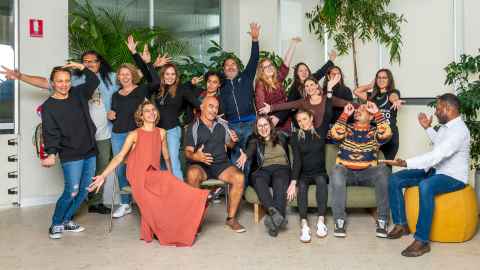Calling Indigenous and Pacific changemakers for 2026 fellowship
29 May 2025
Applications are now open for the Atlantic Fellows for Social Equity 2026 cohort.

The Atlantic Fellows for Social Equity (AFSE) has opened applications for its 2026 cohort, seeking changemakers from Australia, Aotearoa New Zealand and Pacific Island nations to apply for the inter-cultural fellowship.
The fellowship targets mid-career Indigenous and Pacific peoples and their allies who have a compelling and actionable idea for positive change in Indigenous communities or organisations.
AFSE seeks individuals who show both creative thinking and problem-solving abilities, along with a commitment to driving Indigenous-led solutions to build a fairer, more equitable world.
AFSE Executive Director Damien Miller anticipates keen interest in the fellowship this year, noting increasing challenges to equity have strengthened people's determination to drive meaningful change.
"I'm excited to see the agency, creativity and passion that will undoubtedly be reflected in applications," Miller says.
"During challenging times when social equity and Indigenous rights are increasingly under threat, we often witness the emergence of innovative and powerful ideas – concepts that are needed to create lasting positive change in our communities.”
Successful applicants begin their AFSE journey with a fee-free Master of Social Change Leadership offered exclusively to AFSE participants by the University of Melbourne.
The 12-month master’s degree is a blend of academic learning, experiential leadership development, Indigenous community engagement, and cohort-based collaboration – equipping participants to integrate different knowledge systems and approaches to create more effective, holistic, and culturally grounded solutions for positive change.
Professor and Pro Vice-Chancellor Māori Te Kawehau Hoskins of Waipapa Taumata Rau, University of Auckland – a key AFSE partner – said the fellowship differs from conventional leadership programs by centring Indigenous Australian, Māori and Pacific Peoples' knowledges, experiences and ways of organising and leading.
"AFSE builds its approach on Indigenous knowledge systems and principles to address social inequities," Professor Hoskins says.
"Participants learn directly from Indigenous Elders, knowledge holders, community organisers, academic experts and each other, applying these teachings to strengthen their own social change practices and projects."
After completing the master's degree, the 2026 cohort will receive AFSE’s support to implement their social change initiatives developed during their studies. This support includes access to up to AUD$30,000 in funding and ongoing professional development.
The cohort will also join a lifelong global community of Atlantic Fellows – a network of over 940+ changemakers from 70+ countries across 7 Atlantic Fellow programs, united by a shared commitment to creating fairer, more inclusive societies.
Applications close on Monday 28 July 2025, with the fellowship commencing in early 2026.
For more information about eligibility and to apply, visit the AFSE website.
About the Atlantic Fellows for Social Equity
The Atlantic Fellows for Social Equity is an Indigenous-led fellowship programme advancing social equity across Australia, Aotearoa New Zealand, and Pacific Island nations.
Established in 2016 with funding from The Atlantic Philanthropies, founded by philanthropist Chuck Feeney, AFSE cultivates changemakers who employ Indigenous knowledge and perspectives to drive meaningful social transformation.
Hosted by the University of Melbourne in partnership with the University of Auckland, AFSE is the only Indigenous-focused initiative among seven interconnected Atlantic Fellows programmes worldwide.
After their first fellowship year, participants join a global collaborative network of Atlantic Fellows – graduates from all seven programmes – united by the common purpose of advancing fairer, healthier, more inclusive societies.
Contacts
Waipapa Taumata Rau, University of Auckland
Te Rina Ruka-Triponel | Māori media adviser
E: te.rina.triponel@auckland.ac.nz
Kim Meredith | Pacific media adviser
E: kim.meredith@auckland.ac.nz
University of Melbourne
Zane Kingi | AFSE Communications Lead
E: zane.kingi@unimelb.edu.au